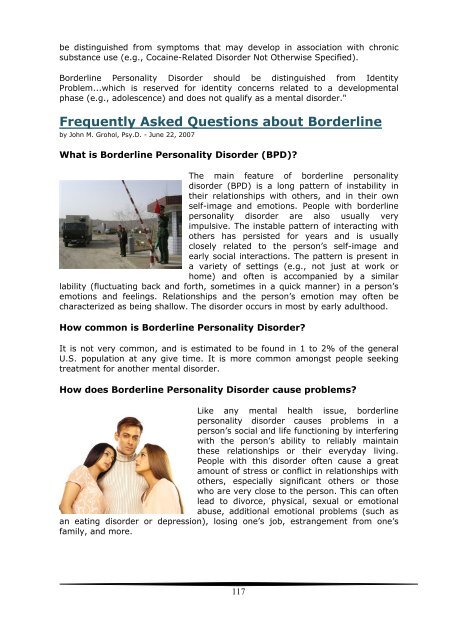personality disorders explained
Antisocial Personality Disorder, Codependence, Narcissism and Borderline
Antisocial Personality Disorder, Codependence, Narcissism and Borderline
You also want an ePaper? Increase the reach of your titles
YUMPU automatically turns print PDFs into web optimized ePapers that Google loves.
e distinguished from symptoms that may develop in association with chronic<br />
substance use (e.g., Cocaine-Related Disorder Not Otherwise Specified).<br />
Borderline Personality Disorder should be distinguished from Identity<br />
Problem...which is reserved for identity concerns related to a developmental<br />
phase (e.g., adolescence) and does not qualify as a mental disorder."<br />
Frequently Asked Questions about Borderline<br />
by John M. Grohol, Psy.D. - June 22, 2007<br />
What is Borderline Personality Disorder (BPD)?<br />
The main feature of borderline <strong>personality</strong><br />
disorder (BPD) is a long pattern of instability in<br />
their relationships with others, and in their own<br />
self-image and emotions. People with borderline<br />
<strong>personality</strong> disorder are also usually very<br />
impulsive. The instable pattern of interacting with<br />
others has persisted for years and is usually<br />
closely related to the person’s self-image and<br />
early social interactions. The pattern is present in<br />
a variety of settings (e.g., not just at work or<br />
home) and often is accompanied by a similar<br />
lability (fluctuating back and forth, sometimes in a quick manner) in a person’s<br />
emotions and feelings. Relationships and the person’s emotion may often be<br />
characterized as being shallow. The disorder occurs in most by early adulthood.<br />
How common is Borderline Personality Disorder?<br />
It is not very common, and is estimated to be found in 1 to 2% of the general<br />
U.S. population at any give time. It is more common amongst people seeking<br />
treatment for another mental disorder.<br />
How does Borderline Personality Disorder cause problems?<br />
Like any mental health issue, borderline<br />
<strong>personality</strong> disorder causes problems in a<br />
person’s social and life functioning by interfering<br />
with the person’s ability to reliably maintain<br />
these relationships or their everyday living.<br />
People with this disorder often cause a great<br />
amount of stress or conflict in relationships with<br />
others, especially significant others or those<br />
who are very close to the person. This can often<br />
lead to divorce, physical, sexual or emotional<br />
abuse, additional emotional problems (such as<br />
an eating disorder or depression), losing one’s job, estrangement from one’s<br />
family, and more.<br />
117

















